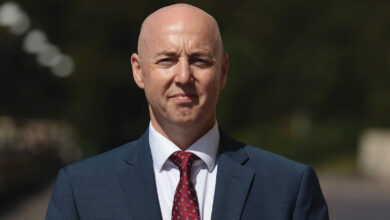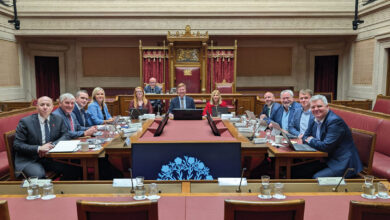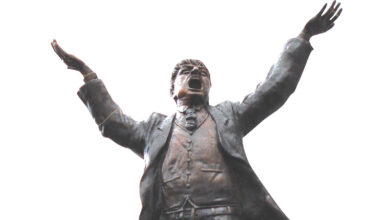Progress in prison reform
 Sue McAllister explains how the Northern Ireland Prison Service is changing its focus and helping to reduce reoffending.
Sue McAllister explains how the Northern Ireland Prison Service is changing its focus and helping to reduce reoffending.
The Northern Ireland Prison Service reform programme is about to be completed. March 2015 marks the end point of the four-year programme in which we have transformed our culture, approach and working practices. But what does this mean in reality? How, and why, have we done it? What does this reformed service look like and how does it work differently?
We have improved the performance of our Prison Service across a wide range of measures, we have transformed the make up of our staff and we have embedded a positive change in our culture. Replacing an approach which focused exclusively on security is an operating model which has, at its core, our contribution to building a safer Northern Ireland by reducing reoffending and supporting offenders to change.
The changes we have made were necessary because the society we serve has changed. We now play our part in building a safer community by tackling those things that help prisoners to return successfully to their communities, and by giving them the skills they need to make a positive contribution to society.
We have made real progress in work to reconfigure our prison estate, to replace and modernise buildings which are no longer fit-for-purpose. We have also addressed some criticisms, for example, holding women and young people on a single site and having a ‘one-size-fits-all’ approach to security for the adult male prisoners in Maghaberry. This will give us a prison estate which supports rehabilitation, which reflects a normalised society, and which represents value for money. When we began, it cost £234 per day to house a prisoner in Maghaberry, our high security prison. Now it costs £109, and we do much more with that money to support and challenge prisoners, and to reduce reoffending.
Reforms to our staff have given us the right staff, in the right numbers, doing the right things.
An early retirement scheme allowed around 500 staff to leave the service, giving us the opportunity to recruit officers into our service for the first time in almost 20 years. We now have about 300 new colleagues, as well as some officers who regraded from other parts of our service. The combination of these new staff, and those experienced officers who have chosen to stay on, gives us an impressive and effective mix, and a staffing group which is now more representative of wider society, with a higher proportion of women, and officers from a range of community backgrounds.
Whilst security, and order and control, will always underpin what we do, the job of a prison officer is now also about positive engagement, about challenging and supporting, and about being part of a regime which focuses on reducing reoffending and building a safer community.
The role has never been more complex and more challenging but, done well, it is rewarding and we are working hard to let the public know about the good work that our staff do and the real difference they can make to the lives of the people in our care. We know that we have more work to do to attract staff from all parts of the community but it is an improving picture and we have been really encouraged by the support we have had from a wide range of stakeholders.
The Northern Ireland Prison Service is a proud public service which has served its community well through the many challenges it has faced in the past. But now, just as Northern Ireland has changed, we have changed, to reflect the needs and expectations of our society and to play our part in building a safer Northern Ireland.
Sue McAllister is Director-General of the Northern Ireland Prison Service.





